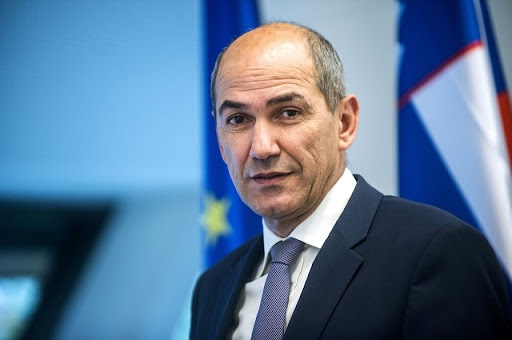Following a political crisis in Slovenia, at the session of the National Assembly on 3 March 2020, Janez Janša was elected as the 14th President of the Government of the Republic of Slovenia. We interviewed him on the health emergency in Europe, the respnses of the European Union and the migrant crisis.
What measures did you take in the fight against Covid-19 as soon as you became Prime Minister?
We took over the Government at a time when no serious measures had been put in place to tackle the epidemic. Stocks with necessary personal protective equipment were empty. We wrote every single order, ordinance and decision from scratch, which required devoting additional efforts to dealing with this insidious virus. In adopting the measures, we followed the instructions of medical experts, while following the situation not only in our neighbouring countries but also in other countries that faced the epidemic before us. We immediately adopted an ordinance on the temporary prohibition of offering and selling goods and services to consumers, allowing only the operation of business providing food and other essential services (post offices, pharmacies, petrol stations, banks, agricultural stores), whereas all other accommodation, hospitality, wellness, sports and recreational, cinematographic, cultural, hairdressing, cosmetics and pedicure services, including gaming and other similar activities, have been suspended.
We allocated doctors without licences, adopted an act on temporary measures regarding judicial, administrative and other public law-related matters, and banned the operation of air services in the Republic of Slovenia, with some exceptions. Educational institutions have been closed meaning that the study process is being carried out remotely, and will continue to be performed this way as long as the risk of the virus being spread persists. Furthermore, we adopted the act proposal for the intervention measure of deferred payment of borrowers’ liabilities, restricted entry into the Republic of Slovenia from Italy, and established checkpoints on the Austrian border. We prohibited movement outside the municipality of residence as well as gatherings of people at public meetings, public events and other events in public places in the Republic of Slovenia.
Being aware of the social and economic impact of measures on peoples’ lives – as we face the overall shutdown of public work and life – we adopted an anti-corona legislative package containing measures to preserve jobs, improve people’s social situation, help the self-employed, keep businesses in operation, improve the liquidity of businesses, and provide support to scientific research projects in the fight against the epidemic and guidelines for measures designed to aid agriculture. This package will be followed by others, all with the aim of getting back to the life we once had as soon as possible after this battle with the coronavirus. As the magnitude of the crisis is truly large and could have major and fatal effects on the coherence of the EU and the economic and monetary union, Slovenia supported the initiative for a common debt instrument.
How is Slovenia handling protective and medical equipment shortages, if any?
Just like other countries that are now making every effort worldwide to find medical equipment, the production of which is concentrated in China, this Government immediately upon its appointment launched activities to supply such equipment and we are doing everything humanly possible to ensure the delivery of the equipment. Not a day goes by without at least one large shipment being delivered to Slovenia. I would like to take this opportunity to thank the Czech Republic for their help not only in connection with the protective equipment but also the repatriation of Slovenian citizens. Solidarity between human beings and states is being put to the test in this ……..
More HERE.

